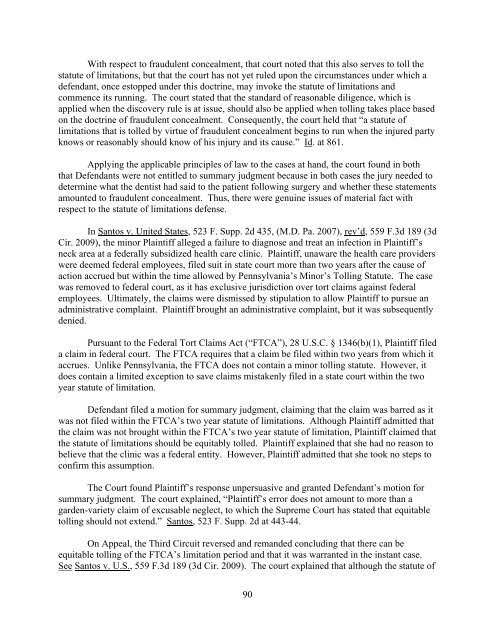2012 PROFESSIONAL LIABILITY UPDATE - Eckert Seamans
2012 PROFESSIONAL LIABILITY UPDATE - Eckert Seamans
2012 PROFESSIONAL LIABILITY UPDATE - Eckert Seamans
You also want an ePaper? Increase the reach of your titles
YUMPU automatically turns print PDFs into web optimized ePapers that Google loves.
With respect to fraudulent concealment, that court noted that this also serves to toll thestatute of limitations, but that the court has not yet ruled upon the circumstances under which adefendant, once estopped under this doctrine, may invoke the statute of limitations andcommence its running. The court stated that the standard of reasonable diligence, which isapplied when the discovery rule is at issue, should also be applied when tolling takes place basedon the doctrine of fraudulent concealment. Consequently, the court held that “a statute oflimitations that is tolled by virtue of fraudulent concealment begins to run when the injured partyknows or reasonably should know of his injury and its cause.” Id. at 861.Applying the applicable principles of law to the cases at hand, the court found in boththat Defendants were not entitled to summary judgment because in both cases the jury needed todetermine what the dentist had said to the patient following surgery and whether these statementsamounted to fraudulent concealment. Thus, there were genuine issues of material fact withrespect to the statute of limitations defense.In Santos v. United States, 523 F. Supp. 2d 435, (M.D. Pa. 2007), rev’d, 559 F.3d 189 (3dCir. 2009), the minor Plaintiff alleged a failure to diagnose and treat an infection in Plaintiff’sneck area at a federally subsidized health care clinic. Plaintiff, unaware the health care providerswere deemed federal employees, filed suit in state court more than two years after the cause ofaction accrued but within the time allowed by Pennsylvania’s Minor’s Tolling Statute. The casewas removed to federal court, as it has exclusive jurisdiction over tort claims against federalemployees. Ultimately, the claims were dismissed by stipulation to allow Plaintiff to pursue anadministrative complaint. Plaintiff brought an administrative complaint, but it was subsequentlydenied.Pursuant to the Federal Tort Claims Act (“FTCA”), 28 U.S.C. § 1346(b)(1), Plaintiff fileda claim in federal court. The FTCA requires that a claim be filed within two years from which itaccrues. Unlike Pennsylvania, the FTCA does not contain a minor tolling statute. However, itdoes contain a limited exception to save claims mistakenly filed in a state court within the twoyear statute of limitation.Defendant filed a motion for summary judgment, claiming that the claim was barred as itwas not filed within the FTCA’s two year statute of limitations. Although Plaintiff admitted thatthe claim was not brought within the FTCA’s two year statute of limitation, Plaintiff claimed thatthe statute of limitations should be equitably tolled. Plaintiff explained that she had no reason tobelieve that the clinic was a federal entity. However, Plaintiff admitted that she took no steps toconfirm this assumption.The Court found Plaintiff’s response unpersuasive and granted Defendant’s motion forsummary judgment. The court explained, “Plaintiff’s error does not amount to more than agarden-variety claim of excusable neglect, to which the Supreme Court has stated that equitabletolling should not extend.” Santos, 523 F. Supp. 2d at 443-44.On Appeal, the Third Circuit reversed and remanded concluding that there can beequitable tolling of the FTCA’s limitation period and that it was warranted in the instant case.See Santos v. U.S., 559 F.3d 189 (3d Cir. 2009). The court explained that although the statute of90









